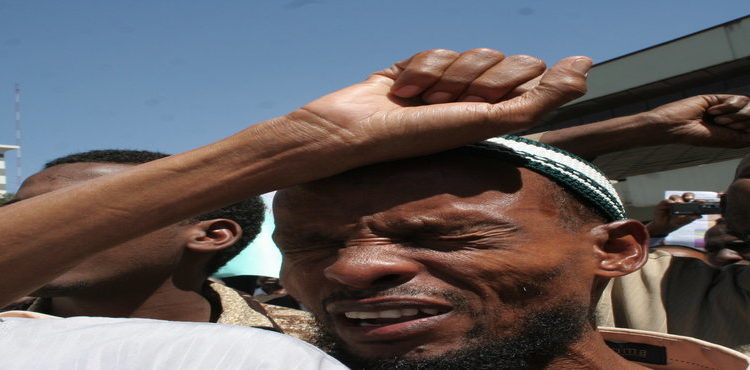By Susan Kendi
Concerns have been raised about the ability of the Kenya police to deal with violence before, during and after the August 8, 2017 elections.
A top official from the African Commission on Human and People’s Rights dispatched a May 26 letter to President Uhuru Kenyatta highlighting extensive extra judicial killings linked to the police, and the lack of investigation and prosecution of cases.
Statistics presented to the African Commission on Human and Peoples’ Rights (ACHPR) show that between January and March this year, Kenya police killed 60 people, more than half of whom (33) were believed to have committed a crime.
The letter by the Commissioner-Rapporteur on the Human Rights Situation in the Republic of Kenya and the Chairperson of the Working Group on Death Penalty and Extra Judicial, Summary or Arbitrary killings in Africa made references to cases and incidents of killings by Kenyan policemen.
There are fears that summary execution of suspected criminals and mysterious disappearances of suspected terrorists are becoming systemic and legitimised in Kenya’s security approach.
On March 31, 2017, a Kenyan police officer killed two unarmed teenagers in broad daylight and in full public in Nairobi’s Eastleigh area. Video footage showed the police officer arguing with a boy before signalling his colleague to pass him a gun. He then stepped on the suspect’s back and shot him. He reloaded the gun and finished him off. The body of another man lay in a pool of blood nearby.
The young men were alleged to be part of a gang known as “Super Power” that targeted police officers. The Independent Policing Oversight Authority called for investigations into the matter.
Last year, in July, local and international civil society groups demanded that President Uhuru Kenyatta form a commission of inquiry to investigate extrajudicial killings and disappearances associated with police officers.
Four police officers were last year in June charged with the murder of human rights lawyer Willie Kimani, his client Josephat Mwenda, and Joseph Muiruri, their taxi driver. They were kidnapped after they left Mavoko Law Courts and were missing until their bodies were found in gunny bags in Ol-Donyo Sabuk River, Machakos, days later.
Kimani’s client, Josephat Mwenda, had been shot by the police and placed under police custody. Upon filing a complaint against the police over excessive use of force, Mwenda was charged for being in possession of drugs, gambling in a public place, and resisting arrest.
Lawyer Willie Kimani was representing his client against the series of charges that he was charged with upon reporting the police officers to Independent Police Oversight Authority (IPOA).
Ombudsman Otiende Amollo said that of 117,936 cases that the commission had received in 2015, 14,235 were against the Kenyan police. Since 2013, the Commission on Administrative Justice (CAJ) has received at least 25,000 reports of killings by the police around Kenya.
The Ombudsman also reported the a case of a fleet manager of Super Metro Bus Company operating on the Nairobi-Kikuyu route and a father of three, Edward Ng’ang’a Kangau. Before his death, he was summoned to Kikuyu Police Station by detective on March 17, 2016. He disappeared, only for his body to be found in Gilgil, Nakuru County.
According to the Organisation Mondiale Contre la Torture(OMCT) report released by the International Commission of Jurists (ICJ-Kenya) the extrajudicial killings of civilians by police and security forces in Kenya increased up by 7 per cent in 2016 compared to 2015.
The report highlighted the United Nations Special Rapporteur on Extrajudicial, Summary or Arbitrary Executions official visit after the 2007/2008 post-election. He found it worrisome that there was existence of police death squads operating under the orders of senior police officials and charged with “getting rid” of suspected criminals.
Later, the Commission on Investigation of Post-Election Violence in Kenya (CIPEV) commonly known as established that Kenya police were responsible for 405 deaths that took place during the 2007/2008 Post-Election violence (PEV). There has been no prosecution of the police officers that were involved in the deaths.
The OMCT report made references of various cases including that of Oscar Kangaro Chief Executive Officer of Oscar Foundation Free legal Aid Clinic Kenya (OFFLACK) and the Advocacy Officer Paul Oulo who were assassinated on March 5, 2009 as they were driving out of town. The Non-Governmental Organization (OFFLACK) had been documenting cases of mysterious disappearances and extra-judicial killings.
On November 2007 OFFLACK had established that the Kenyan Police had killed over 8,000 people in crackdowns against the mungiki with a further 4000 people missing in the last five years till August 2007. The report on this case was released in 2008 and was titled “The veil of impunity.”
The Kenyan National Commission of Human Rights (KNCHR) additionally linked the Kenyan police to the execution of 500 mungiki sect members.
Mr King’ara’s and Oulo’s assassination was said to have no form of state involvement and no prosecutions followed afterwards.
On August 7, 2013 Hassan Guyo a Programmes Director at Strategies for Northern Development (SND) received information that during a joint operation by the Kenya Defence Forces(KDF) and the NPS in Moyale there was excessive use of force to disperse the crowds of demonstrators.
He went to monitor and document human rights violations but was blocked by army officers who had set up a makeshift barrier. When he asked the army officers why they started shooting to disperse the crowds.
He raised his hands and turned towards his motorcycle but was shot in the back.
Guyo’s file was closed without pointing out the person or people responsible for his death.
On September 17, 2013 Peter Wanyama Wanyonyi a human rights lawyer was killed in Bungoma as he was getting back home after a meeting. He was assisting families of victims document cases of mysterious disappearances in the event of a joint security operation commonly referred to as “Okoa Maisha” conducted by the military and the police against the Saboat Land Defence Forces (SLDF) in 2008.
There was no investigation into the assassination.







